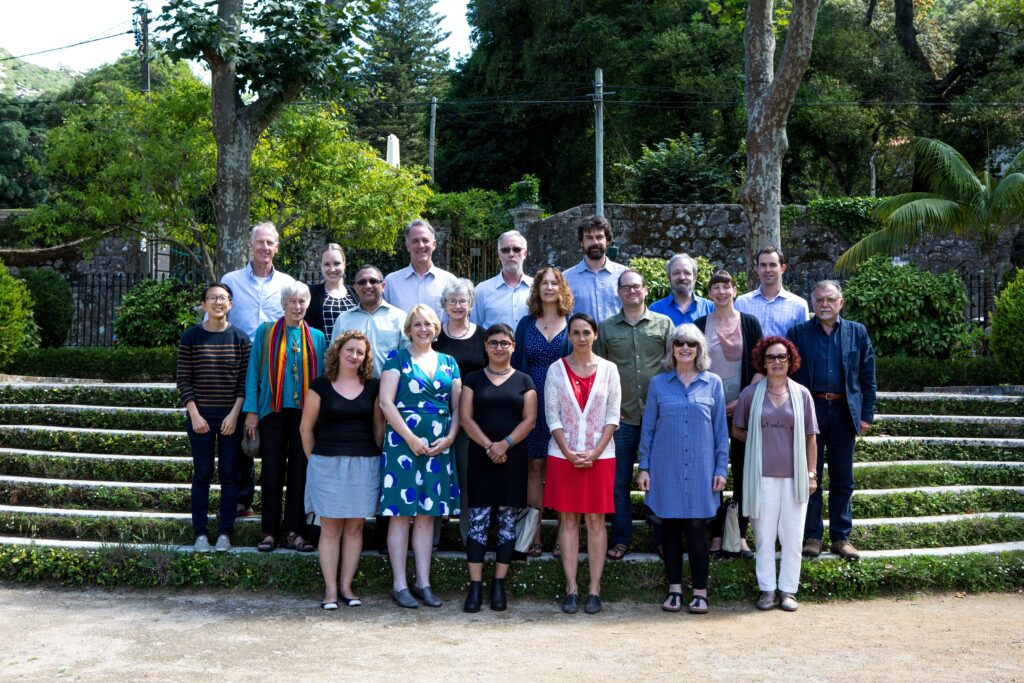The Anthropology of Corruption
Date
Sep 9-15, 2016Organized by
Akhil Gupta and Sarah MuirLocation
Tivoli Palacio de Seteais, Sintra, PortugalPublications
The Anthropology of Corruption, Current Anthropology, Vol. 59, S18, April 2018.Participants
- Leslie Aiello Wenner-Gren Foundation, USA
- Aaron Ansell Virginia Tech, USA
- Diana Bocarejo Universidad del Rosario, Columbia
- Ilana Feldman George Washington University, USA
- Akhil Gupta University of California-Los Angeles, USA
- Kregg Hetherington, Concordia University, Canada
- Julia Hornberger Wits University, South Africa
- Soo-Young Kim Columbia University, USA
- Sarah Muir Columbia University, USA
- Smoki Musaraj Ohio University, USA
- David Nugent Emory University, USA
- John Osburg University of Rochester, USA
- Italo Pardo University of Kent, UK
- Jane Schneider City University of New York Grad Center, USA
- Anu Sharma Wesleyan University, USA
- Cris Shore University of Auckland, New Zealand
- Alan Smart University of Calgary, Canada
- Daniel Jordan Smith Brown University, USA
- Sylvia Tidey University of Amsterdam, Netherlands
ORGANIZER’S STATEMENT: Over the past several decades, corruption has become an object of intense popular concern in otherwise disparate locations around the world. Over the same period, corruption has elicited a robust body of scholarship in disciplines such as political science, economics, and sociology. Meanwhile, anthropologists—wary of reproducing clichéd images of political dysfunction—have often approached the topic with reserve. Recently, however, a corpus of anthropological literature on corruption has begun to coalesce. Examining a variety of illegitimate, illegal, or otherwise irregular political and economic practices, as well as critical discourses about those practices, this literature has developed a properly anthropological approach to corruption. That approach challenges commonplace stereotypes regarding political cultures outside the global North, even as it also takes seriously the vehement complaints about corruption that have energized so many citizens in the global South.
It is an opportune time to take stock of the emergent anthropology of corruption because this literature has now reached critical mass. This symposium will gather together pioneering scholars working on corruption from a wide range of perspectives. The meeting will be aimed both at a stock-taking of where the anthropology of corruption has reached and, more importantly, as a place from which to generate new ideas for future research. The challenges are substantive, methodological, and normative. Participants will offer analyses grounded in research in varying places such as Europe, China, South Asia, Southeast Asia, sub-Saharan Africa, the Middle East, and Latin America. Our aim is to move across an array of theoretical and regional concerns to chart a set of problematics that will animate anthropological studies of corruption in the coming years.
Toward that end, the symposium is organized around five central themes:
- Historicizing Corruption: How has the understanding of corruption changed over time in different locations? Why has corruption become such a potent site of social critique in recent years? What are the local and translocal dynamics that have made corruption in the present moment such an important public concern in many different national contexts?
- The Politics of Corruption: Why does corruption serve as a rallying point for otherwise diverse political parties and social movements? Popular mobilization against corruption is often difficult to locate in terms of left-right politics. How should we assess the possibilities and limits of anti-corruption politics?
- Social Inequality: How can anthropological approaches shed light on the intersection between corruption and inequalities of race, class, caste, gender, region, language, and ethnicity? While social class often correlates strongly with concerns about corruption, we know very little about the relationship between corruption and other regimes of inequality.
- Logics of Law and Governance: How is corruption situated with respect to distinctions between legality and illegality? How can we approach the often intimate relationship between corruption and practices of policing and governance?
- Normative Evaluation: How is “corruption” as a category produced, deployed, and transformed? How do people extend that category beyond the public areas of everyday life and with what effects?
All five themes are crosscut by a concern with how corruption is represented in academic writing. Self-reflexivity about academic uses of the category of “corruption” distinguishes anthropological work from other disciplines. Throughout the symposium, we will consider how to produce anthropological knowledge about corruption that does not take the category for granted, but constructs a critical perspective on its social life.
Current Anthropology supplement on the UCP website
Wenner-Gren Symposium #154
